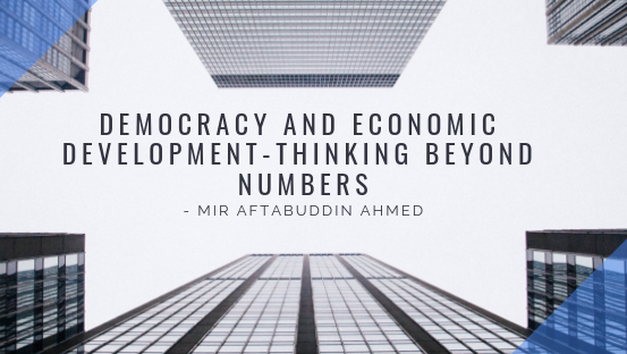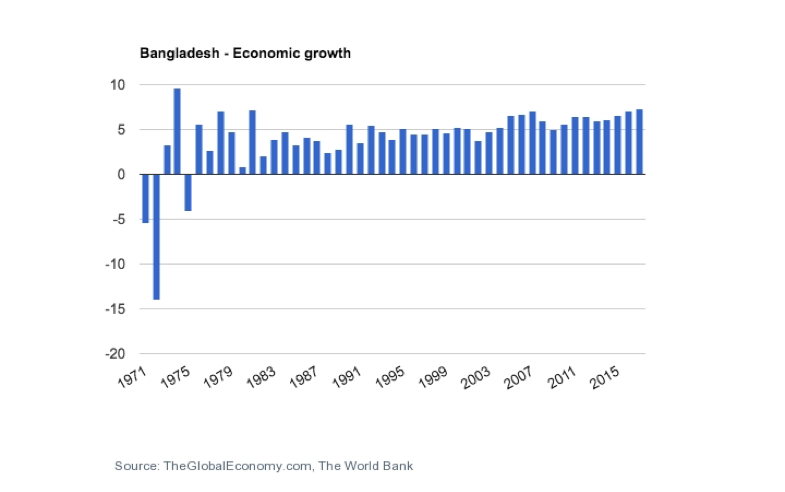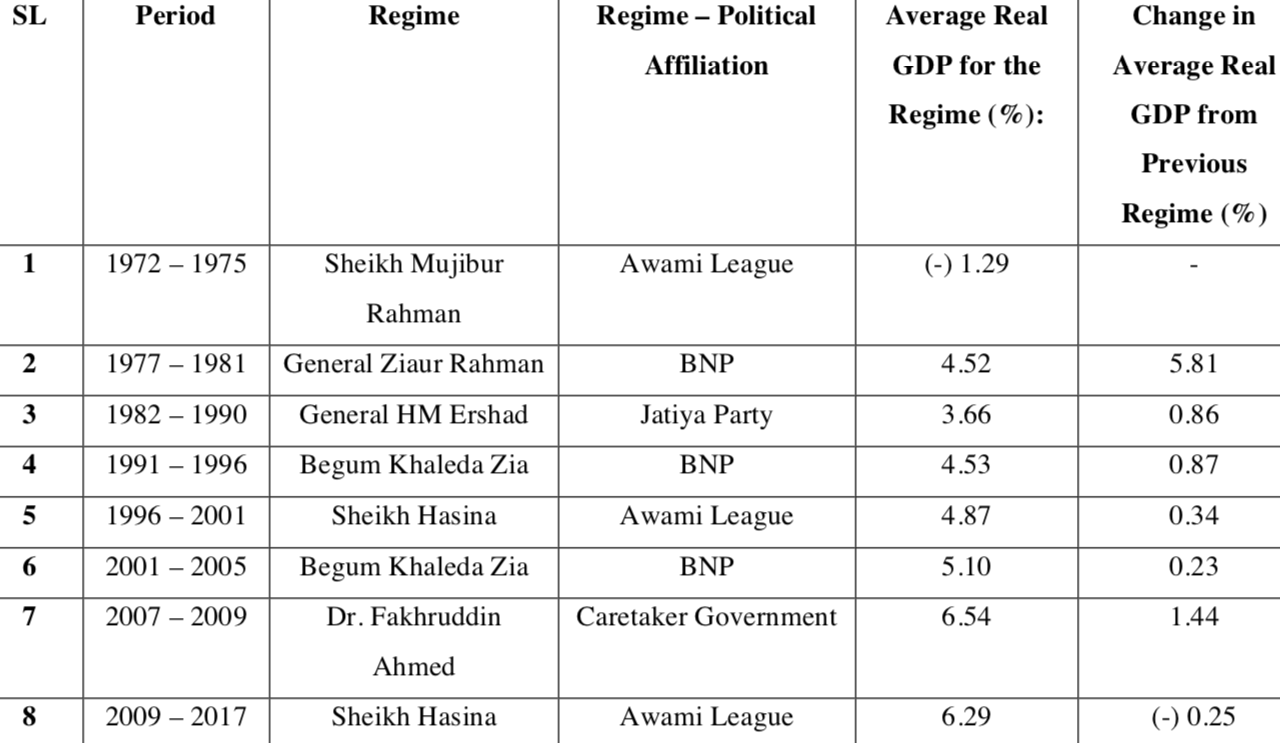ECONOMICS STUDY CENTER, UNIVERSITY OF DHAKA
|
Mir Aftabuddin Ahmed General trends in nominal economic indicators suggest that Bangladesh is on a rampant path of socioeconomic progress – the emphasis of the Awami League Government has been in the vicinity of real GDP increases over the past 10 years of their rule. In all certainty, whether it be in the avenues of enhancing the quantity of education services across the country or investing in information technology, successive regimes headed by Prime Minister Sheikh Hasina have led the country towards impressive strides with relation to increasing GDP figures. Yet in my opinion, there is a need to question the Government on 3 key areas of progress:
Seeking answers to these questions remains complicated – in a multiparty parliamentary democracy such as ours, a brunt of seeking accountability falls in theory, to the political opposition. Nevertheless, it is safe to say that the Bangladesh Nationalist Party (BNP) are in a state of total shatters, which has been a result of internal organizational weaknesses, a lack of central leadership, a tainted political past, and more recently, external harassment from state machineries – the party founded by General Ziaur Rahman has accused the Government of targeting its activists via a series of politically motivatedcases and the methodical shrinking of political space. The centre-right platform is most concerned by the situation of its long-standing Chairperson Begum Khaleda Zia, who has remained at the focal point of electoral politics in the country for the past 38 years. Begum Zia has a divisive political legacy – on one end her dynamic role in the pro-democracy movement against General HM Ershad in the 1980s and her election as the first female Bangladeshi politician to the office of the Prime Minister in 1991, paved the way for parliamentarianism to be re-established in the country. On the other end, she led governments which provided patronage to anti-Liberation groups and have also been criticized for mass levels of corruption. Today, she ironically languishes in prison on charges related to corruption and abuse of power – and to expect the BNP to question the government on public policy issues given their current standing, is utopian to say the least. As such, let us look at the data and try to understand the bigger picture of development, democracy and accountability in Bangladesh. Figure 1 – Date Source: TheGlobalEconomy.com, The World Ban Figure 2 – Data Source: TheGlobalEconomy.com, The World Bank Both Figures 1 and 2 indicate an important tale in the history of our country – if real GDP is the sole determinant of economic performance for a society, then by definition, all successive Governments of independent Bangladesh have fulfilled their obligations to its people. It is from this logic that many in Bangladesh have a common saying, that General HM Ershad’s tenure witnessed remarkable fast paced development and his contribution to the country remains immense – nothing could be further from the truth. The long-term legacy of the former dictator lies in institutionalizing state based corruption and vehemently curbing democratic practices in the country. The legacy of HM Ershad remains more so in the mass Islamization of a secular Bangladesh, an initiative started by General Ziaur Rahman with the aim of establishing a political alternative to the Awami League, and subsequently intensified throughout Begum Zia’s terms as Prime Minister. The legacy of military leaders such as Ershad and Zia is this – even the once secular and progressive Awami League, now compromises with the demands of far-right groups such as the Hefazat-e-Islam. Understanding the journey of modern Bangladesh encourages us to think beyond numbers when it comes to understanding development. Economic growth is defined as the percentage change in the real GDP for a country over a period of time – it forms one of three main facets of the contemporary understanding of the term development, as construed by the Pakistani Economist Mahbubul Haque in the UN-recognised Human Developmental Index (HDI). The HDI is a composite index of three indicators – in addition to real GDP changes, health and education indicators form a cumulative definition of development. And as such, when analyzing Bangladesh’s developmental journey from a broader lens, those tenets of a society which make it a pro-people democracy, including the protection of constitutional rights such as the freedom to assemble, the freedom to express and the freedom to oppose, become an indispensable part of what it means to be a developing society. Therefore, as we see growth across economic indicators, we need to simultaneously measure the levels of democracy within our society. As suggested above, the political opposition has problems of its own – under this Government, Bangladesh has undoubtedly witnessed a slow yet systematic eradication of democratic principles. An example of this, is the current Parliament – the Awami League won a landslide election in December 2018, with its alliance gaining over 90% of the popular vote. Such results are unprecedented for parliamentary democracies, and it is concerning to see these numbers in relation to the kind of victories won in managed electionssuch as those in North Korea or Saddam Hussein’s Iraq. Bangladesh is no North Korea, neither is Sheikh Hasina in any way similar to Saddam Hussein – in fact she is far from it. Sheikh Hasina is the daughter of the Father of the Nation Sheikh Mujibur Rahman and she helms a government rightly credited for giving humanitarian refuge to over 1 million Rohingya refugees. Her party led the political struggle for independence and she has done a unique job to put Bangladesh on the map for its remarkable sectoral diversification initiatives and investments in human development. On the other side of the table however, she is presiding over a second Parliament with a home-grown legislative opposition – to expect the Jatiya Party to be an effective force is ludicrous, given how the party has been an ally of the Awami League in the recent elections and throughout the past 10 years. Parliament is in essence, a rubber stamp body with very little authority to hold Bangladesh’s developmental and political journey to account – and such sets a dangerous precedent for how politics will be practiced in the country in years to come. Therefore, the state of multiparty democracy is indeed concerning. Furthermore, when it comes to issues of the media suppression, the case of Shahidul Alam and curbing of social media dissent through the draconian Digital Security Act 2018, speaks volumes about the way our society, and especially those in positions of power, view criticism. When students marched on the roads to demand safer roads or when they held protests demanding the reconstruction of an archaic quota system – they were met with a hardline approach by law enforcement agencies. Let there be no doubt that the Government got it wrong, they go it horribly wrong – they targeted the very demographic which form the core of Awami League’s Vision 2021 andVision 2041. They targeted the very youth who were inspired by the Awami League’s 2008 electoral message of digitizing Bangladesh’s economy and bringing the perpetrators of war crimes to justice. And because of this, they are distancing themselves from the population which surely appreciates their developmental agendas, but demands such to be inclusive, sustainable and responsive to the rights guaranteed by the Constitution of Bangladesh – the Awami League is nowhere near being politically bankrupt, however it is setting the stage for questions regarding the supremacy of fundamental rights to be held in polar contrast to the economic development of the country. For Bangladesh’s oldest political establishment, this is nothing short than paving the foundations for its own long-term problems – especially at a time when Prime Minister Hasina has indicated her willingness to step down from the position of Party President in the near future. So, what happens next? For one, this Government has made clear of its priorities for the next 5 years – qualitative investments in education, health and economic growth continue to form the cornerstone of Sheikh Hasina’s public policy mandates. This, we wish them well with. However, one hopes that the sheer use of Awami League’s singular political strength across every democratic exercise seen in the country, is transitioned towards a greater sense of competition, good governance reforms and open-ended discussions – whether it be the one man show we saw during the Dhaka City Corporation Mayoral Election, the dominance of the Chatro Leaguein the recently concluded DUCSU elections, or the sad state of Upazila polls, given the Awami League’s historical stature as a democratic establishment which has always spoken about the power of common people, one hopes that Sheikh Hasina ensures that Bangladesh turns the clock back towards a more healthier, democratic, competitive and sustainable political arena. If this does not happen, then forces in our society, including fringe right-wing groups such as the Hefazat e Islam, will fulfill the ever-shrinking political space, and the future of Bangladesh’s developmental journey, both from a normative and tangible sense, will undoubtedly be at stake. In a larger scheme of things, to answer the 3 specific questions I mentioned at the beginning of this piece, we need to look beyond economic numbers. The state of mass incarceration across our jails, the high number of pending cases against our citizens, the politicization of lower courts, the distaste shown towards opposition groups, and the hardline approach taken towards dissent – all of this aggregates towards a Bangladesh that is developing in terms of statistical numbers, but falling way behind in its quest to become a sustainable democracy. We need a functioning parliament which asks these questions, but we do not foresee such in the current context. We demand a pro-Liberation political opposition which can bring the Government under the scanner, but the chances of such look slim today. We want an independent and free media which asks the right questions, rather than simply existing in high numbers – yet in this era of self-censorship and colonial era national security laws, the freedom of the press remains under the scanner by state machineries. Unlike the BNP, I do not demand Begum Khaleda Zia’s release from prison – she must face trial like any other citizen, but I believe that her rights as a former Prime Minister and as a citizen of Bangladesh must be guaranteed, protected and promoted by the state. I stand by my demand that we need immediate reforms in the judicial system and ensure a systematic de-politicization of our state institutions – otherwise, the development we witness today will be questioned, and cases such as that of the wrongfully convicted Jahe Alom, will take precedence over the number of mass projects completed by the Government. Today, I am not afraid in questioning the Government regarding the issues I have brought up – I have faith that the party which led an unparalleled revolution of its people in 1971, a party which housed names such as Husseyn Shaheed Suhrawardy, Maulana Abdul Hamid Khan Bhashani and Bangabandhu Sheikh Mujibur Rahman, will realize their flaws. I believe that in the very near future, Prime Minister Sheikh Hasina will recognize that the fallacy of pitting development against democracy, will not bode well for this country – development and democracy are not mutually exclusive, but remain interdependent cornerstones of building a free, independent, sovereign and inclusive Bangladesh. Nevertheless, development does not automatically equate to a democracy. I certainly live by the dream that as Bangladesh moves towards commemorating the 100thbirthday of Sheikh Mujibur Rahman in 2020 and the Golden Jubilee celebrations of being an independent country in 2021, we collectively comprehend the importance of providing vitality to the consortium of the judiciary, the media, a working opposition and a pro-people civil society, with the unrelenting aim of paving a viable path towards sustainable development, not simply in numbers, but through building a progressive, purposeful and peaceful state-society relationship between those in power and average citizens of this country. Mir Aftabuddin Ahmed Freelance Writer – The Daily Star and The Dhaka Tribune
0 Comments
Leave a Reply. |
Send your articles to: |




